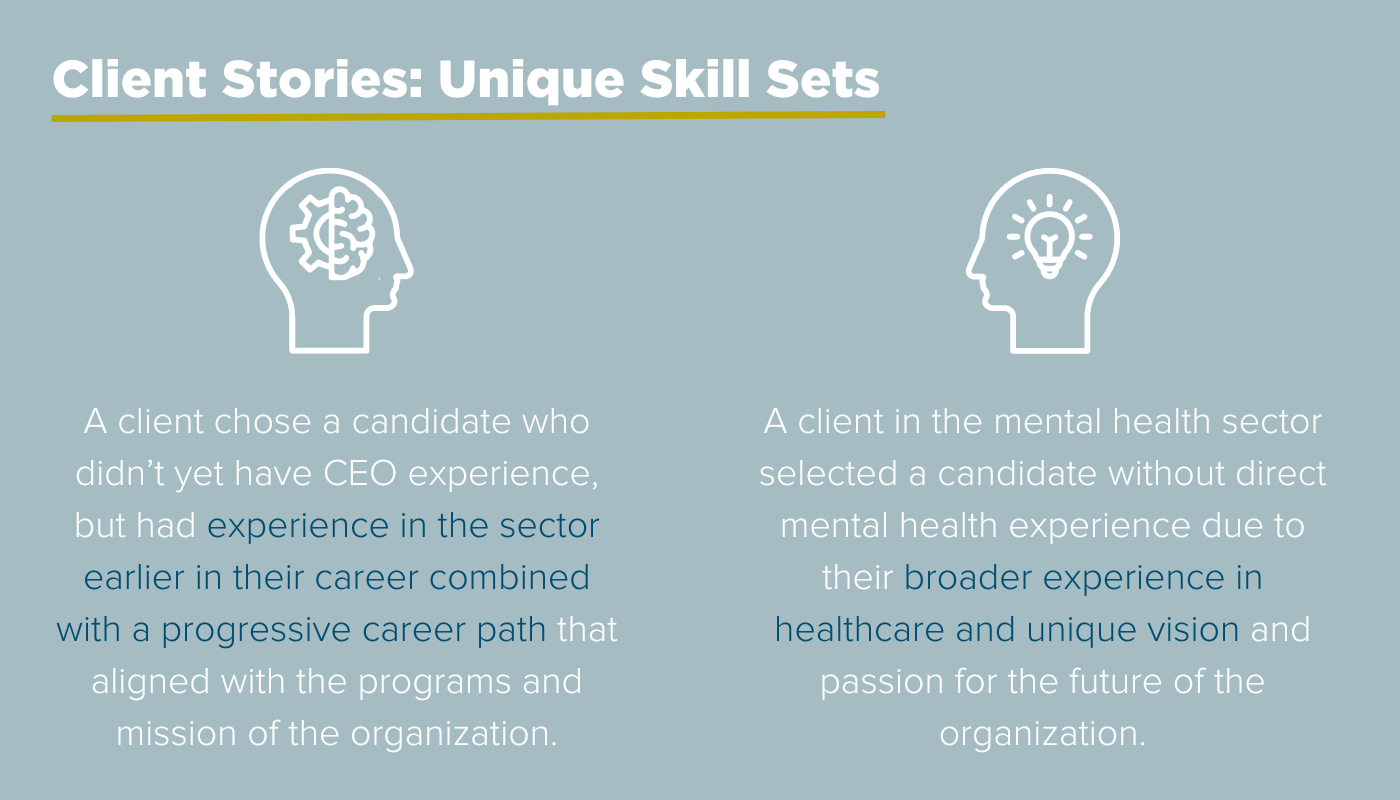Over the last few years, the nonprofit world has experienced an unprecedented level of CEO/President/Executive Director turnover. Much of this turnover has been attributed to retirements, career transitions and new opportunities at larger and better resourced organizations. The COVID-19 pandemic has certainly played a significant role in this leadership exodus with many leaders feeling exhausted and rethinking their next professional move or retirement. As more and more baby boomers seek retirement, this obviously impacts a large number of nonprofit leaders.
This reality has left many nonprofits (and many more over the next several years) with the need to identify and secure new leadership for their organizations. Although embarking on a search for a new CEO/President/Executive Director presents a legitimate challenge for the nonprofit’s Board and staff, it is also a tremendous opportunity to engage a new leader with the experience and attributes to successfully lead the organization over the next several years.
Here are four questions to consider…
1) What are the skillsets and attributes needed for your next organizational leader?
For the most part, nonprofits will focus on adjectives such as energetic, dynamic, entrepreneurial, experienced, etc. to describe their ideal next leader. Of course, it makes sense to find candidates who have as many of these qualities as possible, although some of these attributes can be subjective depending on different viewpoints.
It is even more important, however, to focus on the skillsets and accomplishments of your next potential CEO/President/ED. For instance, does the candidate have a track record of accomplishing specific goals and objectives that translate well to those of your nonprofit? These goals and objectives should be ranked in the direct order of the primary responsibilities of your organization: program delivery; revenue generation; organizational growth and impact; Board/donor/volunteer engagement; staff management, etc.
As you analyze the skillsets and attributes that are essential for your next organizational leader, it is important to weigh these factors against other considerations – for example, can a successful candidate come from another nonprofit sector or be a first-time CEO? We’ve seen success in both of these instances: One of our clients in the mental health sector selected a candidate without direct mental health experience due to their broader experience in healthcare and unique vision and passion for the future of the organization. Another client chose a candidate who didn’t yet have CEO experience, but had experience in the sector earlier in their career combined with a progressive career path that aligned with the programs and mission of the organization. In both instances, the search committees recognized how the candidates’ skillsets and accomplishments, while unique, aligned with the vision and goals for the organization.

2) What is your organization’s current strategic direction and/or vision?
Some nonprofits have an organizational path that is grounded in strategic priorities and guided by a strategic plan and/or vision developed by the previous CEO with the support of volunteer and institutional leadership. Other nonprofits are more focused on the day-to-day operations or require a new leader to come in and help develop a clearer vision for the future. It is important for both the nonprofit and potential candidates to understand the role of the new CEO in the strategic direction of the organization. Will the new leader work on the sustainability and periodic enhancement of certain aspects of the nonprofit, a bolder elevation of key areas (e.g., programs, revenue, constituency, etc.), or a more dramatic reevaluation of the mission and services of the organization? Determining and agreeing upon these goals prior to the public launch of the search is crucial. (For more advice on how to think about strategic planning as you prepare for a leadership transition, see my colleague Bill Weber’s article: 5 Don’ts and Dos for Recruiting a New Nonprofit CEO/Executive Director.)
3) How will your organization be able to attract a diverse candidate pool for the CEO role?
More and more, organizations are recognizing the importance of recruiting talented and motivated leaders who value diversity, equity and inclusion. Most nonprofits understandably want to have a recruitment pool that represents a diverse range of candidates. The most important criteria in attracting candidates committed to these values and from various backgrounds is evaluating and strengthening your organization’s diversity, equity, and inclusion efforts. If potential candidates see a clear commitment and engagement around these values in an organization’s culture, they are much more likely to explore the potential opportunity of becoming the next leader of that nonprofit. We’ve helped clients communicate their commitment to DEI in a variety of ways, including highlighting mission-specific programs that reach marginalized populations, sharing internal goals from DEI-focused action plans, and including a diverse group of staff and stakeholders in candidate interviews.
4) Who needs to be involved in the interview process and how will the final selection be made?
From a governance standpoint, the decision of hiring the next CEO is with the nonprofit’s Board of Trustees. Most often, a Search Committee of the Board is formed (sometimes the Board’s Executive Committee serves in this capacity) to vet a number of candidates. The Committee will then make a recommendation to the Board on a finalist candidate for Board approval. Depending on the nonprofit and organizational culture (or by-laws) there will be variations on the process and the role of the entire Board. In most cases, however, the Search Committee is empowered with the final selection process (pending Board approval), and it is important that key Board members such as the Board Chair and other highly active and influential members are represented on the Committee.
Careful planning and consideration should also be given to the engagement of senior staff and other staff members in the process. This could be done by gathering input from select staff members regarding the qualifications and attributes needed in the next leader, and what they see as organizational opportunities and challenges. As an organization narrows down a pool to one or two finalist candidates, the opportunity for them to meet with select members of senior staff should certainly be a consideration. In addition, communicating as appropriate with the staff regarding the search process and progress will go a long way in keeping them informed and included.



